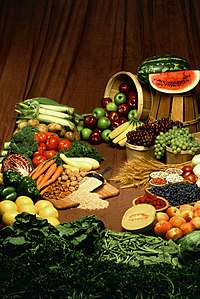Whole food

Unrefined, whole foods
Whole foods are plant foods that are unprocessed and unrefined, or processed and refined as little as possible, before being consumed.[1] Examples of whole foods include whole grains, tubers, legumes, fruits, vegetables.[2]
There is some confusion over the usage of the term surrounding the inclusion of certain foods, in particular animal foods. The modern usage of the term whole foods diet is now widely synonymous with "whole foods plant-based diet" with animal products, oil and salt no longer constituting whole foods.[3]
The earliest use of the term in the post-industrial age appears to be in 1946 in The Farmer, a quarterly magazine published and edited from his farm by F. Newman Turner, a writer and pioneering organic farmer. The magazine sponsored the establishment of the Producer Consumer Whole Food Society Ltd, with Newman Turner as president and Derek Randal as vice-president.[4] Whole food was defined as "mature produce of field, orchard, or garden without subtraction, addition, or alteration grown from seed without chemical dressing, in fertile soil manured solely with animal and vegetable wastes, and composts therefrom, and ground, raw rock and without chemical manures, sprays, or insecticides," having intent to connect suppliers and the growing public demand for such food.[4] Such diets are rich in whole and unrefined foods, like whole grains, dark green and yellow/orange-fleshed vegetables and fruits, legumes, nuts and seeds.[1]
See also
- Organic food culture
- Raw foodism
- Specialty foods
- Traditional food
References
^ ab Bruce, B; Spiller, GA; Klevay, LM; Gallagher, SK (2000). "A diet high in whole and unrefined foods favorably alters lipids, antioxidant defenses, and colon function" (PDF). Journal of the American College of Nutrition. 19 (1): 61–7. doi:10.1080/07315724.2000.10718915. PMID 10682877..mw-parser-output cite.citation{font-style:inherit}.mw-parser-output q{quotes:"""""""'""'"}.mw-parser-output code.cs1-code{color:inherit;background:inherit;border:inherit;padding:inherit}.mw-parser-output .cs1-lock-free a{background:url("//upload.wikimedia.org/wikipedia/commons/thumb/6/65/Lock-green.svg/9px-Lock-green.svg.png")no-repeat;background-position:right .1em center}.mw-parser-output .cs1-lock-limited a,.mw-parser-output .cs1-lock-registration a{background:url("//upload.wikimedia.org/wikipedia/commons/thumb/d/d6/Lock-gray-alt-2.svg/9px-Lock-gray-alt-2.svg.png")no-repeat;background-position:right .1em center}.mw-parser-output .cs1-lock-subscription a{background:url("//upload.wikimedia.org/wikipedia/commons/thumb/a/aa/Lock-red-alt-2.svg/9px-Lock-red-alt-2.svg.png")no-repeat;background-position:right .1em center}.mw-parser-output .cs1-subscription,.mw-parser-output .cs1-registration{color:#555}.mw-parser-output .cs1-subscription span,.mw-parser-output .cs1-registration span{border-bottom:1px dotted;cursor:help}.mw-parser-output .cs1-hidden-error{display:none;font-size:100%}.mw-parser-output .cs1-visible-error{font-size:100%}.mw-parser-output .cs1-subscription,.mw-parser-output .cs1-registration,.mw-parser-output .cs1-format{font-size:95%}.mw-parser-output .cs1-kern-left,.mw-parser-output .cs1-kern-wl-left{padding-left:0.2em}.mw-parser-output .cs1-kern-right,.mw-parser-output .cs1-kern-wl-right{padding-right:0.2em}
^ "Forks Over Knives - What to Eat?". Forks Over Knives. Retrieved 2017-05-04.
^ Campbell, T. Colin; Jacobson, Howard (2013). Whole: Rethinking the Science of Nutrition (chapter 1). Dallas, Texas: BenBella Books. ISBN 9781939529848.
^ ab Conford, P.(2011) The Development of the Organic Network, p.417. Edinburgh, Floris Books
ISBN 978-0-86315-803-2.